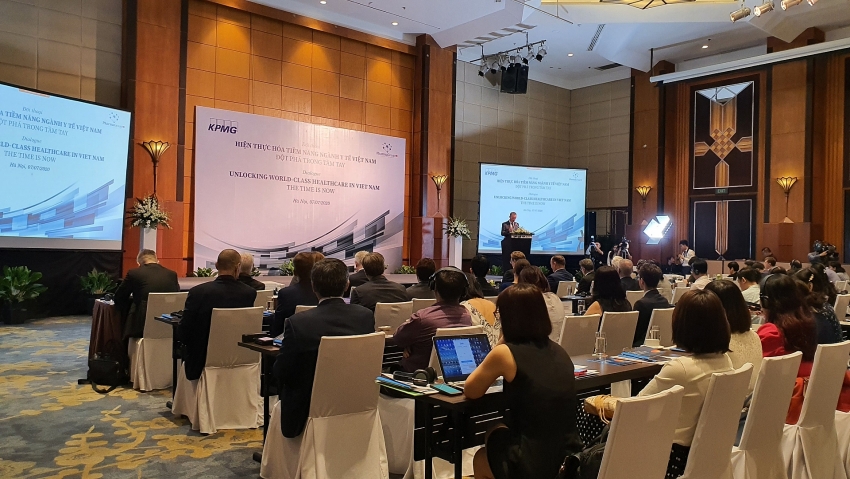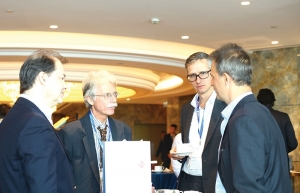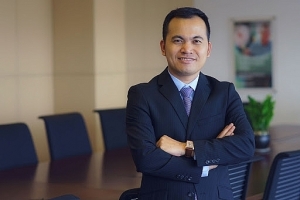Vietnam urged to unlock potential for world-class healthcare
 |
| The healthcare dialogue held by KPMG and Pharma Group |
Titled “Unlocking world-class healthcare in Vietnam: the time is now”, the event attracted the participation of over 85 representatives from the government, embassies, and companies from startups to multinationals.
At this multi-stakeholder dialogue, experts discussed opportunities to realise the full potential of the healthcare sector in Vietnam, especially how to shape an enabling, predictable long-term business environment that in turn improve patient access and fully yield the value that the innovative pharmaceutical industry can bring.
Addressing short-term challenges in key legislations, for example the issues relating to Certificate of Pharmaceutical Product, Marketing Authorisation extension in the Circular guiding Drug Registration (Circular No. 32/2018/TT-BYT dated November 12, 2018) and ensuring the proper execution of existing regulations – such as the price negotiation mechanism for brand-name medicines as regulated in the Tender Circular (Circular No.15/2019/TT-BYT dated July 11, 2019) – will ensure opportunities are unlocked as fast as possible.
Also at the event, KPMG Vietnam has launched its latest report titled Value of Innovation which examined the current and potential benefits that the innovative pharmaceutical industry could bring to Vietnam.
Luke Treloar, director, Strategy, National Head of Healthcare & Life Science, said, “KPMG is excited and delighted to work on this exciting report. This industry touches all of our lives. Expanded access to cutting-edge medicines and quality care, and sustainable health financing will ensure that Vietnam meets its ambitious development goals."
Vietnam has high potential for life sciences and healthcare in Vietnam which bring faster access to more innovative pharmaceutical products; increased employment; local pharma sector development; foster startup and entrepreneuship ecosystem; domestic research and development and clinical trials expertise development; and attracting more FDI and tax.
However, according to the KMPG report, the key challenges to Vietnam’s pharma sector development include a clear sectoral vision; clinical trials; local manufacturing; presence and technology transfer; education and workforce development; health financing; and access to innovative medicine.
The report said that the Vietnamese government should consider implementing targeted policies and reforms in a wide variety of areas, from investment incentives and legislation to education and training. Thus, the Government of Vietnam is well-positioned to promote growth in the economy through targeted and informed policies, and collaboration with industry stakeholders. These factors will be crucial in developing a dynamic and vibrant future for both the industry and the nation as a whole.
The report also suggested key policies for the Southeast Asian country in the coming years, including continuing to prioritise the pharmaceutical industry on a national level; establishment of a comprehensive legal and regulatory framework and dedicated support institutions; introducing incentives to drive investments into the industry; increasing emphasis on industry-focused education and training; promoting health innovation and improving health financing.
Nitin Kapoor, Pharma Group vice chairman, noted that, “Pharma Group members fully endorse key conclusions from the report, including specifically the opportunity to unlock ever better healthcare provision to the people of Vietnam, and bring further investments to Vietnam, from R&D to digital infrastructure and capabilities. PG members are ready to work hand-in-hand with domestic companies, healthcare professionals, and government to make these opportunities come alive.”
Vietnam is well-positioned to join the value chain in life-sciences ahead of several other ASEAN countries, and can attract further investment from the innovative pharmaceutical industry to make this happen. The time to consider the value this can bring to Vietnam is now.
According to the latest statistics of the Drug Administration of Vietnam, as of August 2019, Vietnam has approximately 184 local and foreign pharmaceutical manufacturers operating in the market, of which 225 manufacturing sites qualified for GMP-WHO. Most of these companies produce generics for local consumption. 90 per cent of the Active Pharmaceutical Ingredients (APIs) for these products come from imported sources, primarily China and India.
What the stars mean:
★ Poor ★ ★ Promising ★★★ Good ★★★★ Very good ★★★★★ Exceptional
Related Contents
Latest News
More News
- Japanese business outlook in Vietnam turns more optimistic (January 28, 2026 | 09:54)
- Foreign leaders extend congratulations to Party General Secretary To Lam (January 25, 2026 | 10:01)
- 14th National Party Congress wraps up with success (January 25, 2026 | 09:49)
- Congratulations from VFF Central Committee's int’l partners to 14th National Party Congress (January 25, 2026 | 09:46)
- 14th Party Central Committee unanimously elects To Lam as General Secretary (January 23, 2026 | 16:22)
- Worldwide congratulations underscore confidence in Vietnam’s 14th Party Congress (January 23, 2026 | 09:02)
- Political parties, organisations, int’l friends send congratulations to 14th National Party Congress (January 22, 2026 | 09:33)
- Press release on second working day of 14th National Party Congress (January 22, 2026 | 09:19)
- 14th National Party Congress: Japanese media highlight Vietnam’s growth targets (January 21, 2026 | 09:46)
- 14th National Party Congress: Driving force for Vietnam to continue renewal, innovation, breakthroughs (January 21, 2026 | 09:42)




 Tag:
Tag:





















 Mobile Version
Mobile Version